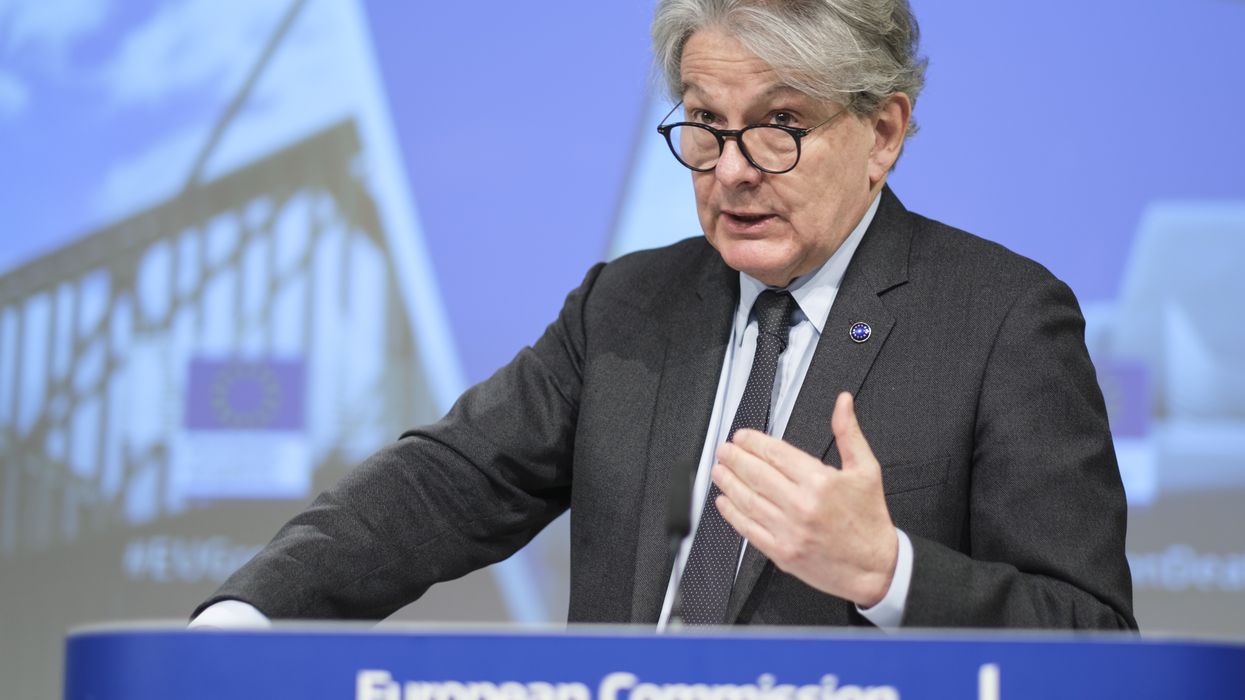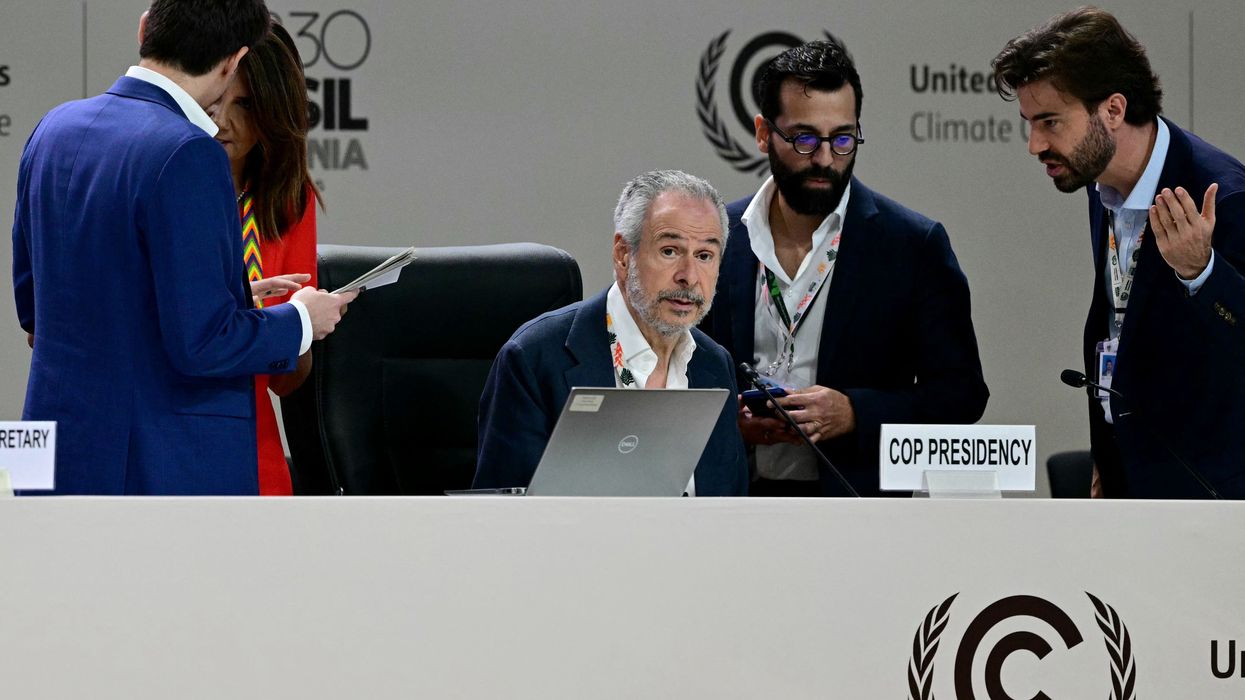Trump Ban on European Disinformation Opponents Decried as 'Authoritarian Attack on Free Speech'
"Is McCarthy’s witch hunt back?" asked Thierry Breton, a former EU commissioner now barred from entering the US.
European Union leaders and others around the world this week condemned President Donald Trump's administration for imposing a travel ban on a former EU commissioner and leaders of nongovernmental groups that fight against disinformation and hate speech—or, as US Secretary of State Marco Rubio called them, "agents of the global censorship-industrial complex."
Rubio said in a Tuesday statement that his department "is taking decisive action against five individuals who have led organized efforts to coerce American platforms to censor, demonetize, and suppress American viewpoints they oppose. These radical activists and weaponized NGOs have advanced censorship crackdowns by foreign states—in each case targeting American speakers and American companies."
The five people barred from the United States are Imran Ahmed, the British CEO of the Center for Countering Digital Hate; Clare Melford, another Brit from the Global Disinformation Index; Josephine Ballon and Anna-Lena von Hodenberg of the German group HateAid; and Thierry Breton, a French leader who helped craft the EU's Digital Services Act (DSA) as a commissioner.
"Is McCarthy’s witch hunt back?" Breton wrote on X—a social media platform that belongs to erstwhile Trump ally Elon Musk and was recently fined €120 million, or $140 million, for violating DSA's transparency obligations.
"As a reminder: 90% of the European Parliament—our democratically elected body—and all 27 member states unanimously voted the DSA," Breton noted. "To our American friends: 'Censorship isn't where you think it is.'"
As Anda Bologa, a senior researcher with the Tech Policy Program at the Center for European Policy Analysis, explained earlier this year, "the DSA tackles illegal or demonstrably harmful activity—terrorist propaganda, child sexual abuse material, and foreign-backed election meddling." The 2022 law also "mandates that platforms publish transparency reports on takedown requests, justify their decisions, and offer users appeal mechanisms."
In a Tuesday statement, the European Commission said it "strongly condemns" the US travel ban, adding: "Freedom of expression is a fundamental right in Europe and a shared core value with the United States across the democratic world. The EU is an open, rules-based single market, with the sovereign right to regulate economic activity in line with our democratic values and international commitments."
"Our digital rules ensure a safe, fair, and level playing field for all companies, applied fairly and without discrimination," the commission continued. "We have requested clarifications from the US authorities and remain engaged. If needed, we will respond swiftly and decisively to defend our regulatory autonomy against unjustified measures."
European Commission President Ursula von der Leyen posted the statement on X, and various other EU leaders shared similar messages.
German Foreign Minister Johann Wadephul said that "the entry bans imposed by the USA, including those against the chairpersons of HateAid, are not acceptable. The Digital Services Act ensures that everything that is illegal offline is also illegal online."
"The DSA was democratically adopted by the EU for the EU—it does not have extraterritorial effect," he continued. "We intend to address other interpretations fundamentally with the USA in the transatlantic dialogue, in order to strengthen our partnership."
The German campaigners, Ballon and von Hodenberg, said in a statement that "we will not be intimidated by a government that uses accusations of censorship to silence those who stand up for human rights and freedom of expression."
French President Emmanuel Macron said Wednesday that "I have just spoken with Thierry Breton and thanked him for his significant contributions in the service of Europe. We will stand firm against pressure and will protect Europeans."
Agnès Callamard, the secretary general of Amnesty International—which supports the DSA—wrote on X: "Now the US is sanctioning a former EU official and several heads of NGOs monitoring hate speech and disinformation—on the ground that they are censoring American speech! Laughable. Social media platforms must be regulated. Better and more. Not less."
Due to Brexit, the DSA notably does not apply to the United Kingdom, but that didn't spare the two UK campaigners targeted by the Trump administration. A spokesperson from Melford's group told the BBC that "the visa sanctions announced today are an authoritarian attack on free speech and an egregious act of government censorship."
"The Trump administration is, once again, using the full weight of the federal government to intimidate, censor, and silence voices they disagree with," the spokeperson added. "Their actions today are immoral, unlawful, and un-American."
Tom Malinowski, a former Democratic congressman from New Jersey running to return to the House of Reprentatives, called out the State Deparment he previously served in under the Obama administration for sanctioning leaders of groups "that flag instances of antisemitism, harm to children, deep fakes, and vaccine disinformation online."
"Most Americans want online platforms that are safer for our kids, with less hateful and harmful content," he added. "It is not censorship to urge social media and AI companies to enforce their own rules against these things! The State Department's action is a blatant attack on free speech."
Earlier this month, the US advocacy group Free Press released a report detailing Trump's "war on free speech" based on "more than 500 reports of verbal threats, executive orders, presidential memoranda, statements from the White House, actions by regulators and agencies, military and law enforcement deployment and activities, litigation, removal of website language on .gov websites, removal of official history and information at national parks and museums, and discontinued data collection by the federal government."
The report says that "while the US government has made efforts throughout this nation's history to censor people's expression and association—be it the exercise of freedom of speech, religion, press, assembly, or the right to petition the government for redress—the Trump administration's incessant attacks on even the most tentatively oppositional speech are uniquely aggressive, pervasive, and escalating."


